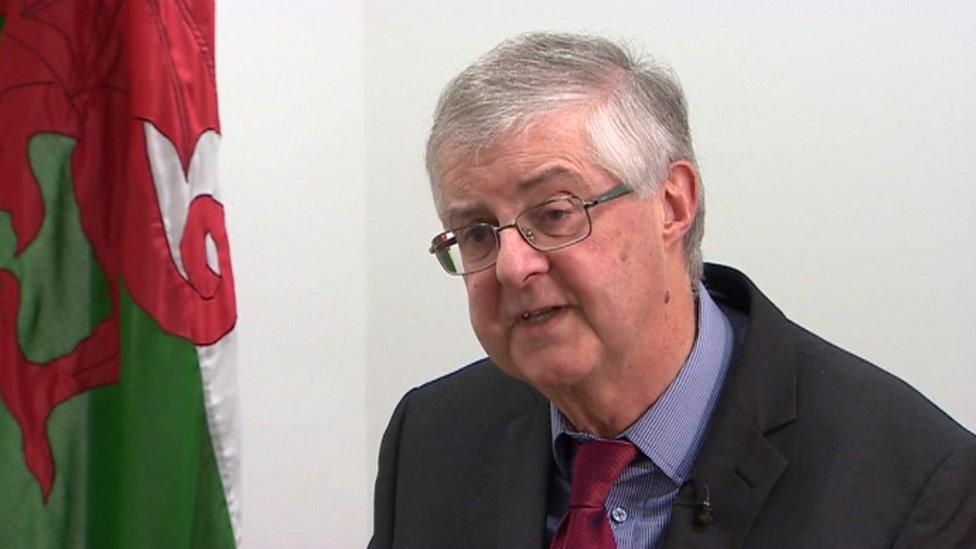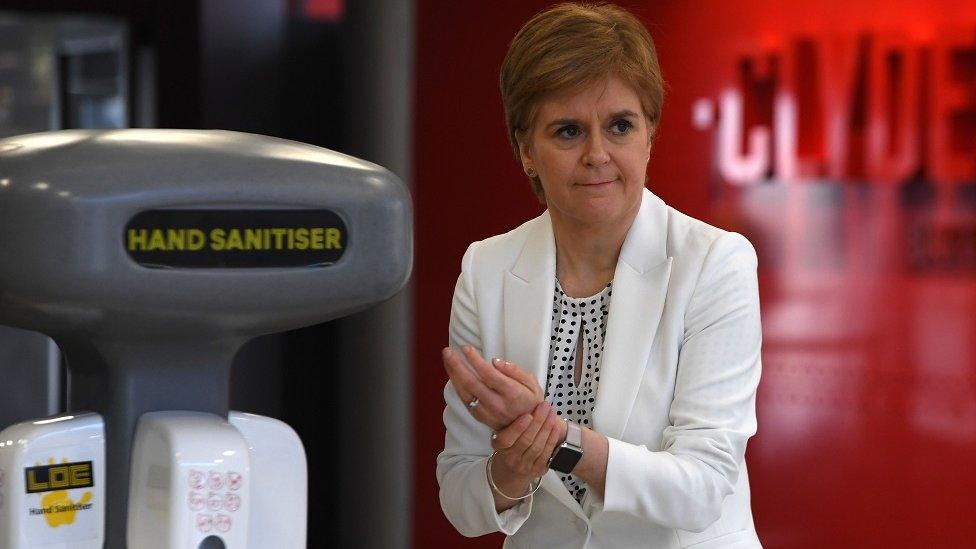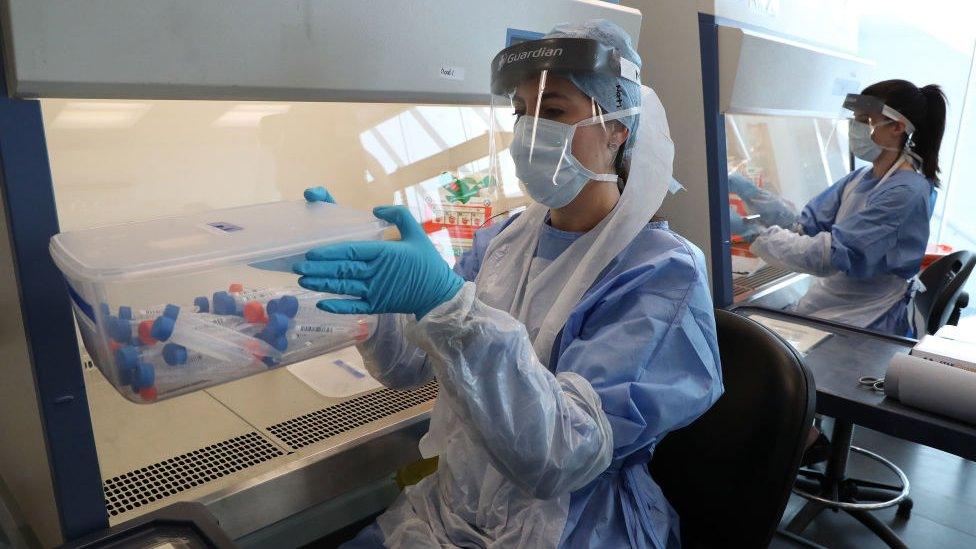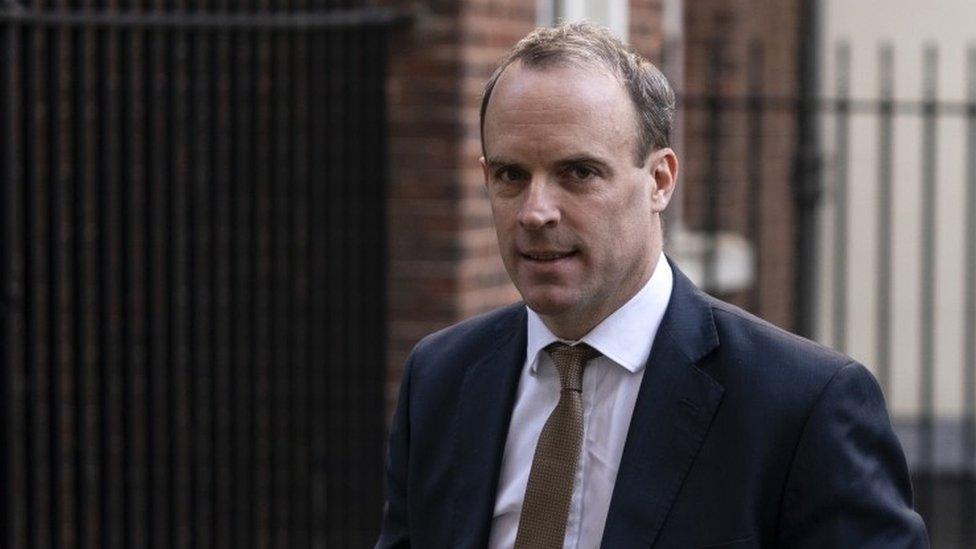Coronavirus: 'Traffic light' system to lift lockdown in Wales
- Published
- comments

Mark Drakeford says he would "do things differently" to the other nations if that was right for Wales
Coronavirus restrictions in Wales could be eased at the end of the current three-week lockdown period.
When it happens it will be a matter of judgement backed by medical and scientific advice, First Minister Mark Drakeford said on Friday.
Until then there will be "small changes" to restrictions, including a stricter ban on second home visits and rules stopping loitering outside.
Ending lockdown could be in phases, "like a traffic light in reverse".
There would be a move from red - some "careful and controlled" relaxation - to green, which would be "much more like the lives we had before the crisis hit".
The amber zone would see more restrictions lifted and, if the virus is not re-emerging, Wales could then move to the green zone, he said.
Asked when Wales might enter the red zone, the first minister said: "I hope we will be in a position to do that at the end of the current three-week lockdown period".
"We will have to have had hospital admissions falling consistently for 14 days," Mr Drakeford told BBC Radio Wales Breakfast with Oliver Hides.
"They have been falling over the last week so it's not impossible that we will get to that point and in that case we can move into the red zone."

Mark Drakeford also wants to clamp down on second home use amid the coronavirus outbreak
The framework includes questions to consider before decisions are made around relaxing restrictions.
They are:
Would easing a restriction have a negative effect on containing the virus?
Does a particular measure pose a low risk of further infection?
How can it be monitored and enforced?
Can it be reversed quickly if it creates unintended consequences?
Does it have a positive economic benefit?
Does it have a positive impact on people's wellbeing?
Does it have a positive impact on equality?
Mr Drakeford said: "I certainly accept that our seven tests are not an algorithm. You don't just put the question at the top and the answer falls out at the bottom.
"They will, in the end, involve judgements, weighing up these factors one against another, coming to a decision in the round."
He denied his newly published plan for exiting lockdown could undermine the UK-wide approach to the crisis.
"I think Scotland publishing their framework yesterday, Wales publishing our framework today is a contribution to crafting that UK approach," he said.
"By sharing with one another our thinking, by being open with one another about the issues that we think will matter in different parts of the United Kingdom, I think that will help us to craft a way forward, in which we all understand what one another are doing and we come to a common set of ideas and a common timetable for going about them."
Health officials will spend the next fortnight drawing up plans over how community testing for coronavirus will work, he added.
The plan to test for new patients then isolate the sick is seen as key to allowing lockdown to be eased.
Mr Drakeford said the plan would involve recruiting people to carry out the test and track the data, but he declined to give a figure on how many would be needed, or the number of tests required.
Last week the Welsh Government dropped a target of 5,000 tests per day, with capacity currently at around 1,300.
The UK government is sticking to a target of 100,000 daily tests by the end of April.

TRANSLATOR: What do all the terms mean?
A SIMPLE GUIDE: How do I protect myself?
LOOK-UP TOOL: Check cases in your area
MAPS AND CHARTS: Visual guide to the outbreak

Mr Drakeford has also announced some lockdown rules in Wales are being made stricter to make it clear people cannot remain away from the place they live.
They should take exercise "as close as possible" to home, according to the Welsh Government's updated rules, external.
Cyclists should not travel further than a "reasonable walking distance from home."
'Prolonged sitting'
They should "take steps to manage risk" in order to avoid putting extra strain emergency services and to stick to routes they know well.
The new rules state people should not drive to exercise unless absolutely necessary.
People should not use exercise as "an excuse" to do something else, like having picnics or sitting on benches for "a prolonged period."
Families with children who have certain learning difficulties, including autism, will be allowed to leave the house more than once a day.
Conservative Mark Isherwood AM, who chairs the assembly cross party groups on autism and disability, welcomed the changes for people with specific medical needs.
But he added: "It is shocking and extremely disappointing that it has taken the Welsh Government more than two weeks to make this change since the guidance was amended in England, despite the significant impact on the lives of these families."
- Published27 September 2020

- Published22 April 2020

- Published23 April 2020

- Published26 November 2020

- Published22 April 2020
